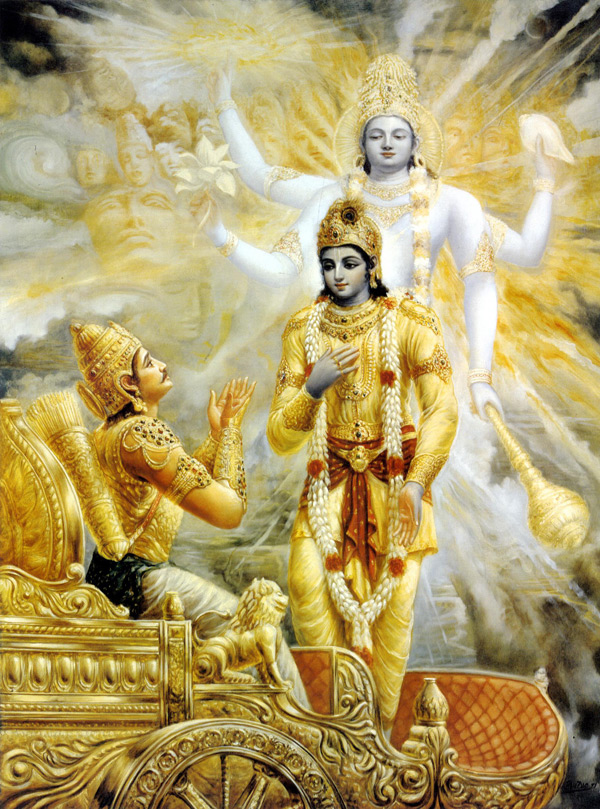The world is bound by actions other than those performed ‘for the sake of sacrifice’; do thou, therefore, O son of Kunti, perform action for that sake (for YAJNA) alone, free from all attachments.
-Geeta – Ch 3, Verse 9
Yajna here means “any self-sacrificing work, undertaken in a spirit of self-dedication, for the blessing of all”.
Chinmayananda, Swami. The Holy Geeta (p. 275). Central Chinmaya Mission Trust. Kindle Edition.
‘Karma’ or one’s actions are inextricably linked to one’s state of mind. The mind cannot attain a state of tranquility unless actions performed by the doer are in the right spirit. Salvation, ‘Moksha,’ ‘Mukti,’ or emancipation, and whatever else we call it doesn’t depend upon our physical state. The propensity of the mind to go out through the senses and grasp onto the sense objects is bondage. When the mind is turned inwards and constantly dwells upon the Self within, it is free. People believe one cannot attain Mukti while encased in one’s physical body, but this is untrue. ‘Jeevan Mukta'(One who is free while living) possesses a physical body like any of us, but his mind is wholly reigned in and doesn’t venture out into the world. This is ‘Mukti.’ Such a person is said to have attained Godhood. He’s now beyond Nature, though maintaining his physical form. He is no longer bound by his actions, for he’s reached a state of ‘Akarma,’ or the state of actionlessness.
The Self, God, or the Divine is actionless. All actions are performed by Nature alone. Our ‘doer-ship’ of actions is a product of delusion arising out of Maya, which imposes upon the Man a false ego rooted in the mind and body. The true source of ‘i-ness’ is the divine Self, but we, being deluded, consider our body and the mind as the Self. This is ignorance and instills into us the fake perception of being the ‘doer’ of actions. Once this veil is torn asunder by spiritual knowledge, one comes to know himself as ever-free, actionless, and beyond Nature. This is what the Lord says,
All actions are performed, in all cases, merely by the Qualities in- Nature (GUNAS). He whose mind is deluded by egoism, thinks “I am the doer”.
-Geeta – Ch3, Verse 27
In modern parlance, Karma yoga means not asking the question, “What’s in it for me?”. When one’s efforts are undertaken with selfish motives, one only deepens one’s ignorance, and this is where these famous verses from the Geeta guide us on how to perform actions.
Thy right is to work only, but never to its fruits; let the fruit-of- action be not thy motive, nor let thy attachment be to inaction.
Geeta – Cp 3, Verse 47
You perform (your) bounden duty; for, action is superior to inaction. Even the maintenance of the body would not be possible for you by inaction.
-Geeta – Ch 3, Verse 8
In our work-a-day world, we must understand the term ‘bounden duty’ (Niyatam Karma) in the text to include all ‘obligatory actions’ of an individual in his home, in his office, and in the society as a national being. Thus, not to perform diligently all our duties in the home and in the world outside would be inaction.
Working for the sole purpose of attaining the desired fruit is demonic and contrary to our supreme goal of God-realization. Karma yoga, practiced for a considerable period of time, reduces the pressure of ‘vasanas’ on the mind and makes it tranquil.
Let’s define ‘vasana’ now, which has no equivalent representation in the English language. ‘Vasana’ are latent mind impressions carried by us from many of our past incarnations through the performance of actions and their resultant reactions. ‘Vasana-pressure’ determines the extent of our engagement in the outer world. It leads to fresh desires and propels us into action. As long as ‘vasanas’ exist, the mind is impure, and vasana-catharsis through Karma yoga(Yoga of right action) is the way ahead to the removal of our false Ego that envelopes the Self, the ‘Sat-Chit-Ananda’, the ‘consciousness-existence-bliss’ within us.
“Vasanas create the mind; where the mind is, there revels the ego. To the extent the vasanas have been reduced, to that extent the mind has become non-existent. Where the mind has ended, there the reflection of the Consciousness called the ‘ego’ has also ended.“
– Chinmayananda, Swami. The Holy Geeta (p. 313). Central Chinmaya Mission Trust. Kindle Edition.
Now, other Yoga methods are equally potent in volatilizing the Ego, but Krsna prescribes Karma Yoga to Arjuna first, for Arjuna is a man of action. In fact, Arjuna, in a state of confusion, begins to regard inaction and action-lessness as the same and asks this of the Lord. Why must a man act when to be ‘actionless’ is the goal?
The Lord replies
Not by non-performance of actions does man reach ‘actionlessness’; nor by mere renunciation does he attain ‘Perfection’.
Verily, none can ever remain, even for a moment, without performing action; for, everyone is made to act helplessly, indeed, by the qualities born of PRAKRITI.
He who, restraining the organs-of-action, sits thinking in his mind of the sense-objects, he, of deluded understanding, is called a hypocrite.
But, whosoever, controlling the senses by the mind, O Arjuna, engages his organs-of-action in KARMA YOGA, without attachment, he excels.
-Geeta – Ch 3, Verse 4 – 7
Hence the performance of one’s action in the right spirit is an unavoidable stepping stone towards actionlessness. Having once attained this state, a man is free to act or not act; neither is he compelled to act by Nature, nor does he suffer any reactions from his actions.

Very aptly explained the crux of the topic.A must read.
Very well written bhaiyya. You know gyan is very difficult for me and I opened this topic with the similar mind set, but it’s remarkably easy on me, very apt for my situation right now. Thank you.
[…] https://nitin-srivastava.net/karma-yoga-actionlessness-through-right-action/ […]